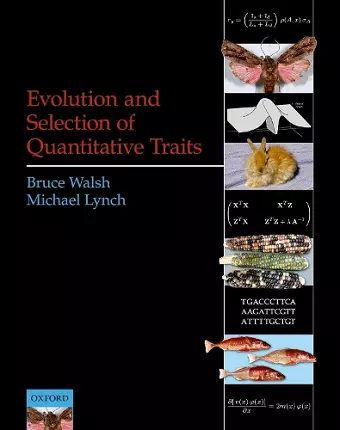Evolution and Selection of Quantitative Traits
Michael Lynch author Bruce Walsh author
Format:Hardback
Publisher:Oxford University Press
Published:12th Jul '18
Currently unavailable, and unfortunately no date known when it will be back

Quantitative traits-be they morphological or physiological characters, aspects of behavior, or genome-level features such as the amount of RNA or protein expression for a specific gene-usually show considerable variation within and among populations. Quantitative genetics, also referred to as the genetics of complex traits, is the study of such characters and is based on mathematical models of evolution in which many genes influence the trait and in which non-genetic factors may also be important. Evolution and Selection of Quantitative Traits presents a holistic treatment of the subject, showing the interplay between theory and data with extensive discussions on statistical issues relating to the estimation of the biologically relevant parameters for these models. Quantitative genetics is viewed as the bridge between complex mathematical models of trait evolution and real-world data, and the authors have clearly framed their treatment as such. This is the second volume in a planned trilogy that summarizes the modern field of quantitative genetics, informed by empirical observations from wide-ranging fields (agriculture, evolution, ecology, and human biology) as well as population genetics, statistical theory, mathematical modeling, genetics, and genomics. Whilst volume 1 (1998) dealt with the genetics of such traits, the main focus of volume 2 is on their evolution, with a special emphasis on detecting selection (ranging from the use of genomic and historical data through to ecological field data) and examining its consequences.
...the authors have done an admirable job at integrating the newest results to provide an unusually current and comprehensive guide. It is hard to imagine that anyone publishing in this area could make the case that they have added to what is known without consulting this wonderful book. * Jarrod Hadfield, Biological Sciences, University of Edinburgh, The Quarterly Review of Biology *
Decades in the making, the somewhat audacious conceit of collecting everything that we know about evolutionary genetics into a single tome pays dividends in the form a book that will serve as a central resource in the library of every evolutionary biologist. * Patrick C. Phillips, University of Oregon, USA *
This book has the same outstanding merits as the previous volume. It is authoritative, comprehensive (covering an extremely wide range of topics) and beautifully written. It will remain as the definitive account of the material that it considers for many years to come. * Warren J. Ewens, University of Pennsylvania, USA *
Their 1998 book has been an essential and popular teaching and reference text for quantitative geneticists for 20 years. At last the long promised and awaited second volume is available, structured to provide both an introduction for the graduate student and a reference volume for the seasoned professional. The authors display both an impressive breadth and depth of knowledge and ability to explain it. * William G. Hill, University of Edinburgh, UK *
The book is a fabulous resource; it will be the go-to place to learn about a broad variety of topics in population and quantitative genetics, from measuring differences among populations to estimating selection from genomic sequence data. A real strength of the book is the expert overview of the topics alongside pointers to the key papers for more details. * Sarah P. Otto, University of British Columbia, Canada *
This long-awaited volume gives an exceptionally comprehensive and thoughtful overview of the field, and will be invaluable to all those who are trying to understand the genetics of complex traits. As well as covering quantitative genetics, it gives a thorough treatment of the most recent methods for making inferences from DNA sequence data. * Nicholas H. Barton, Institute of Science and Technology, Austria *
This book is a virtuoso synthesis of the theory and application of selection and evolution of complex traits. Much more than an advanced textbook, it is the most comprehensive treatment and synthesis of the theory and analysis of selection and evolution of quantitative traits to date. * Peter M. Visscher, University of Queensland, Australia *
A masterful synthesis of the growing points in selection analysis. * Stevan J. Arnold, Oregon State University, USA *
ISBN: 9780198830870
Dimensions: 284mm x 223mm x 62mm
Weight: 3878g
1496 pages